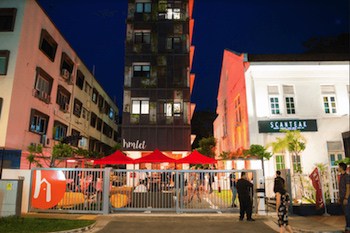
Hmlet’s first co-living tower in Singapore, Hmlet@Joo Chiat was launched in November last year
Singapore-based co-living platform Hmlet last week announced that it has raised $6.5 million in a series A round led by Sequoia India, the India affiliate of US venture capital giant Sequoia Capital.
The co-living startup, which has 13 locations in Singapore, five in Tokyo, and one in Hong Kong, said that the fresh capital would be used to expand its services throughout Asia. This latest round of financing was the Singapore co-living provider’s second round of funding in the past 12 months, after it raised $1.5 million in a seed round led by Arum Investment in November last year.
The Singapore-based residential operator announced its financial milestone during the same week that Warburg Pincus committed up to $413 million to Hong Kong-based co-living startup Weave, as investors look to shared accommodation ventures as the next opportunity after the success of co-working and shared offices.
Making Homes for Asia’s Millennials
The backing from Sequoia India comes less than five months after Hmlet expanded into its third city, by acquiring its Hong Kong-based competitor we r urban. That July deal added 30 new co-living locations to the company’s portfolio, while adding to its existing facilities in Tokyo and Singapore.
“Hmlet’s foundation was based on the insight that existing housing supply in large cities is not fit for the current millennial, mobile generation,” said Yoan Kamalski, the company’s CEO. The venture’s co-founder added that the company sees bringing “the many benefits of the sharing economy to personal living spaces” as part of its mission.
Occupying Whole Buildings

Hmlet’s Kamalski looks pleased with his company’s $6.5 million in fresh financing
Among the 13 locations that the startup has opened in Singapore, two are leases of entire buildings, including a project 6 Sarkies Road in the city’s Newton area that was launched in April and Hmlet’s inaugural dedicated project which it opened in Joo Chiat last November.
“Hmlet’s centralised supply model, of taking over full buildings compared to standalone units across many buildings, is particularly compelling because it brings a true sense of community along with economies of scale,” Abheek Anand, a Singapore-based managing director with Sequoia Capital India said in a statement.
The two-year-old company says it currently accommodates over 300 people around Asia and expects to double that capacity by the end of 2018.
Co-living Hits the Headlines
In recent years, co-living has becoming increasingly popular in Asia, especially in the region’s priciest urban hubs, as residential rents and housing prices rise beyond the reach of many young professionals.
Hong Kong and Singapore, two of the centres where co-working is currently flourishing both were ranked among the least affordable housing markets in the world in a survey by the Demographia non-profit group this year, with Hong Kong leading the list as the world’s least affordable place to secure shelter, followed by Singapore in fifth place.
In answer to this trend, investors in the region have been on the hunt for successful co-living strategies.
In addition to Sequoia India’s bet on Hmlet, and Warburg Pincus’ tie-up with Weave, Sequoia China, together with Warburg Pincus earlier this year led a RMB 4 billion investment into Ziroom, one of the biggest rental apartment operators in China.
In Hong Kong, private equity firm Pamfleet also teamed with local developer District15 to open an en-bloc co-living building in the city’s commercial hub of Tsim Sha Tsui earlier this month.
Leave a Reply